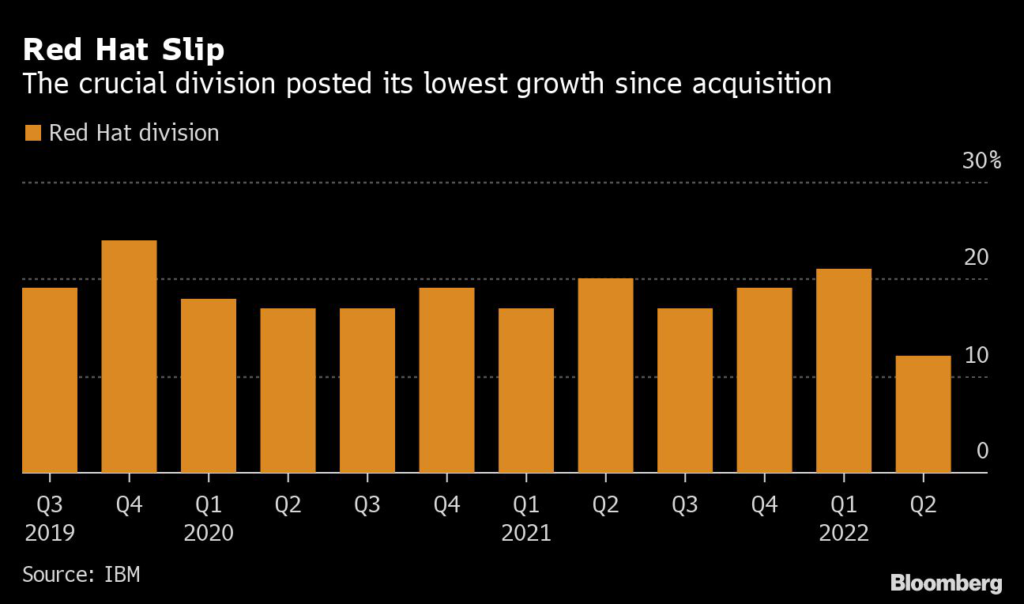(Bloomberg) — International Business Machines Corp. shares fell the most in almost nine months on Tuesday after the tech company lowered its forecasts for free cash flow this year due to the impact of a strong dollar and the loss of business in Russia.
The revision overshadowed results that topped analysts’ estimates, signaling that demand for mainframe computers, consulting and cloud services remains strong amid concerns of a pullback in tech spending.
IBM, which gets about half of its sales outside the Americas, said it estimates free cash flow of $10 billion this year, at the low end of a previous range of $10 billion to $10.5 billion. The company was also forced to pull out of profitable operations in Russia after the country invaded Ukraine and the US imposed strict sanctions. The reduced free cash flow range isn’t a result of a broader business slowdown Chief Financial Officer Jim Kavanaugh said in an interview. “Our demand remains solid,” he said.
The shares fell as much as 7.4%, the most since October, to $127.86 in New York. IBM has been a rare pocket of stability in the tech market meltdown, gaining 3.3% this year through Monday compared with a 31% loss for the iShares Expanded Tech Sector ETF.
Sales rose 9% to $15.5 billion in the three months ending June 30, the company said Monday in a statement. Analysts were expecting an average of $15.2 billion according to data compiled by Bloomberg.
Chief Executive Officer Arvind Krishna’s goal has been to pivot Big Blue from its traditional business of infrastructure and information-technology services to the fast-growing cloud-computing market. Acquisitions have been a major part of the strategy, with IBM buying more than 25 companies under Krishna’s tenure, largely focused on bolstering the company’s hybrid-cloud offerings.
Hybrid-cloud revenue jumped 18% to $5.9 billion in the quarter. Krishna wants IBM to distinguish itself by targeting a so-called hybrid model, which helps clients store and analyze data across on-premises infrastructure, private cloud services and servers run by major public providers such as Amazon.com Inc. and Microsoft Corp. Software unit revenue increased 6.4% to $6.2 billion, missing estimates. Consulting sales gained 10% to $4.8 billion, beating estimates.
“We continue to expect full-year revenue growth at the high end of our mid-single digit model,” Krishna said Monday in the statement.
Red Hat sales increased 12% — the slowest rate since it was acquired in 2019. The division has been a key part of Krishna’s turn-around strategy, and typically posts growth closer to 20%. Last week, IBM named Matt Hicks as the new head of as the segment, promising little change in strategy.
The growth dip is due to currency and there’s no material slowdown in the unit, which grew 17% at constant currency, Kavanaugh said.
Owing to the release of a new mainframe, the fastest-growing segment in the second quarter was infrastructure, which jumped 19% to $4.2 billion. Despite pivoting from on-premise offerings, the company remains one of the biggest makers of mainframe computers, which have long served as a foundation of a business’s most important applications. This segment drove much of the quarter’s overall upside, and “probably isn’t sustainable,” wrote analysts at Vital Knowledge after the release.
In November, IBM spun off a large portion of its legacy infrastructure services unit into a new company called Kyndryl Holdings Inc. Sales to Kyndryl continue to make up a significant portion of IBM’s revenue.
Tech peers that have significant overseas exposure including Oracle Corp., Salesforce Inc., and Microsoft, have seen growth curtailed by a surging US dollar. IBM said current exchange rates will weigh on the full-year forecast by six percentage points, up from a three-to-four point estimate in April. Currency weighed on second quarter growth by seven percentage points, the company said.
Gross margin was 53.4%, beating the 52.9% analysts expected but down from 55.2% a year earlier. The margin decline was due to climbing labor and component costs and the company is addressing it through pricing, Kavanaugh said on an investor call.
Earnings excluding some costs were $2.31 a share, two cents higher than the average analyst estimate. Free cash flow was $3.3 billion in the quarter, beating estimates for $2.46 billion.
(Updates shares.)
More stories like this are available on bloomberg.com
©2022 Bloomberg L.P.











